- A+
场景模拟
假设你有一批非标设备需要对接,对方提供了如下协议文档:
协议概述
设备作为TCPServer,端口6666
字节序:Little-Endian,即低地址存放低位
请求回复
需要你主动发起读取请求:0x01 02 03 04
设备回复:0x08 01 41 D6 3D 71 1A 20
参数说明
- 总字节数
(byte[0])即0x08:用于简单的校验
- 运行状态
(byte[1])即0x01:1为运行;其他为停止
- 设备温度
(byte[2]-byte[5])即0x41 D6 3D 71:单精度浮点数值26.78
- 电机转速
(byte[6]-byte[7])即0x1A 20:对应16进制无符号整型,倍率0.01值66.88
驱动开发
我们根据上面的协议,开发驱动。请先浏览上一篇驱动简介
创建驱动项目
-
在解决方案->Drivers文件夹,右键添加->新建项目->C#类库
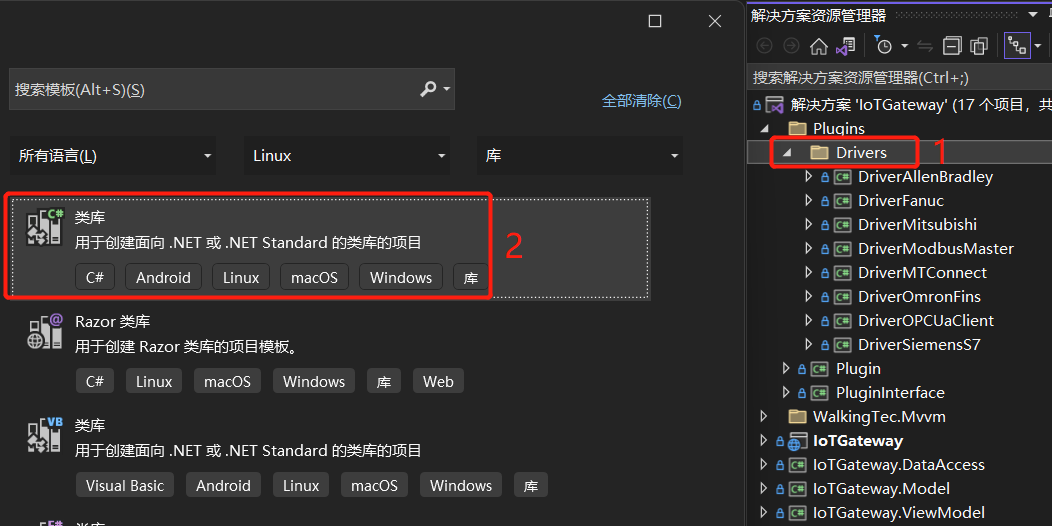
-
项目名DriverSimTcpClient,放在
iotgatewayPluginsDrivers路径下

-
修改Class1为SimTcpClient
-
双击项目,修改配置
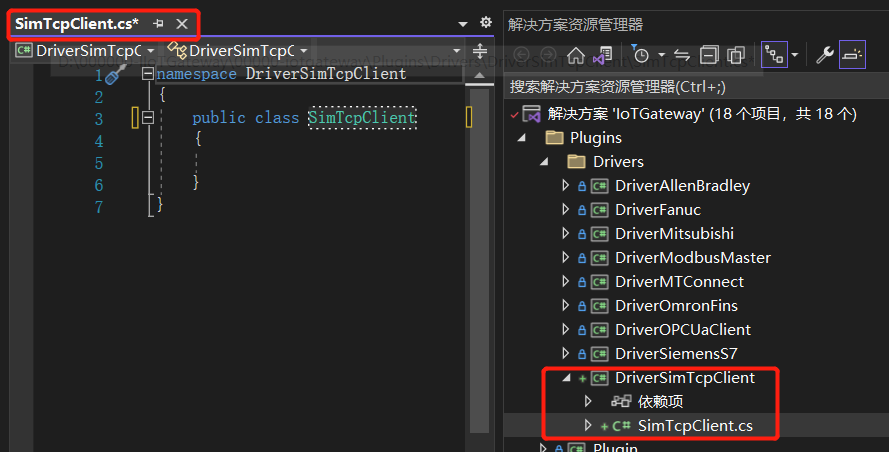
<Project Sdk="Microsoft.NET.Sdk"> <PropertyGroup> <TargetFramework>net6.0</TargetFramework> <OutputPath>../../../IoTGateway/bin/Debug/net6.0/drivers</OutputPath> <CopyLocalLockFileAssemblies>true</CopyLocalLockFileAssemblies> <ImplicitUsings>enable</ImplicitUsings> <Nullable>enable</Nullable> </PropertyGroup> <ItemGroup> <PackageReference Include="SimpleTCP.Core" Version="1.0.4" /> </ItemGroup> <ItemGroup> <ProjectReference Include="....PluginInterfacePluginInterface.csproj" /> </ItemGroup> </Project> :::info 说明
OutputPath节点指定了生成项目的文件夹
SimpleTCP.Core是一个TCP客户端库(你也可以自己写)
ProjectReference节点引用了PluginInterface项目
CopyLocalLockFileAssemblies节点可以确保你引用的nuget拷贝到driver文件夹下
:::
编写项目代码
using PluginInterface; using SimpleTCP; using System; using System.Text; namespace DriverSimTcpClient { [DriverSupported("SimTcpServerDevice")] [DriverInfoAttribute("SimTcpClient", "V1.0.0", "Copyright iotgateway© 2022-06-04")] public class SimTcpClient : IDriver { /// <summary> /// tcp客户端 /// </summary> private SimpleTcpClient? client; /// <summary> /// 缓存最新的服务器返回的原始数据 /// </summary> private byte[] latestRcvData; #region 配置参数 [ConfigParameter("设备Id")] public Guid DeviceId { get; set; } [ConfigParameter("IP地址")] public string IpAddress { get; set; } = "127.0.0.1"; [ConfigParameter("端口号")] public int Port { get; set; } = 6666; /// <summary> /// 为了演示枚举类型在web端的录入,这里没用到 但是你可以拿到 /// </summary> [ConfigParameter("连接类型")] public ConnectionType ConnectionType { get; set; } = ConnectionType.Long; [ConfigParameter("超时时间ms")] public int Timeout { get; set; } = 300; [ConfigParameter("最小通讯周期ms")] public uint MinPeriod { get; set; } = 3000; #endregion public SimTcpClient(Guid deviceId) { DeviceId = deviceId; } /// <summary> /// 判断连接状态 /// </summary> public bool IsConnected { get { //客户端对象不为空并且客户端已连接则返回true return client != null && client.TcpClient.Connected; } } /// <summary> /// 进行连接 /// </summary> /// <returns>连接是否成功</returns> public bool Connect() { try { //进行连接 client = new SimpleTcpClient().Connect(IpAddress, Port); client.DataReceived += Client_DataReceived; } catch (Exception) { return false; } return IsConnected; } /// <summary> /// 收到服务端数据 /// </summary> /// <param name="sender"></param> /// <param name="e"></param> private void Client_DataReceived(object? sender, Message e) { //如果收到的数据校验正确,则放在内存中 if (e.Data.Length == 8 && e.Data[0] == 0x08) latestRcvData = e.Data; } /// <summary> /// 断开连接 /// </summary> /// <returns>断开是否成功</returns> public bool Close() { try { client.DataReceived -= Client_DataReceived; //断开连接 client?.Disconnect(); return !IsConnected; } catch (Exception) { return false; } } /// <summary> /// 释放 /// </summary> public void Dispose() { try { //释放资源 client?.Dispose(); } catch (Exception) { } } /// <summary> /// 发送数据 /// </summary> private byte[] sendCmd = new byte[4] { 0x01, 0x02, 0x03, 0x04 }; /// <summary> /// 解析并返回 /// </summary> /// <param name="ioarg">ioarg.Address为起始变量字节编号;ioarg.ValueType为类型</param> /// <returns></returns> [Method("读模拟设备数据", description: "读模拟设备数据,开始字节和长度")] public DriverReturnValueModel Read(DriverAddressIoArgModel ioarg) { var ret = new DriverReturnValueModel { StatusType = VaribaleStatusTypeEnum.Good }; ushort startIndex; //判断地址是否为整数 if (!ushort.TryParse(ioarg.Address, out startIndex)) { ret.StatusType = VaribaleStatusTypeEnum.Bad; ret.Message = "起始字节编号错误"; return ret; } //连接正常则进行读取 if (IsConnected) { try { //发送请求 client?.Write(sendCmd); //等待恢复,这里可以优化 Thread.Sleep(Timeout); if (latestRcvData == null) { ret.StatusType = VaribaleStatusTypeEnum.Bad; ret.Message = "没有收到数据"; } else { //解析数据,并返回 switch (ioarg.ValueType) { case DataTypeEnum.UByte: case DataTypeEnum.Byte: ret.Value = latestRcvData[startIndex]; break; case DataTypeEnum.Int16: var buffer16 = latestRcvData.Skip(startIndex).Take(2).ToArray(); ret.Value = BitConverter.ToInt16(new byte[] { buffer16[0], buffer16[1] }, 0); break; case DataTypeEnum.Float: //拿到有用的数据 var buffer32 = latestRcvData.Skip(startIndex).Take(4).ToArray(); //大小端转换一下 ret.Value = BitConverter.ToSingle(new byte[] { buffer32[3], buffer32[2], buffer32[1], buffer32[0] }, 0); break; default: break; } } } catch (Exception ex) { ret.StatusType = VaribaleStatusTypeEnum.Bad; ret.Message = $"读取失败,{ex.Message}"; } } else { ret.StatusType = VaribaleStatusTypeEnum.Bad; ret.Message = "连接失败"; } return ret; } public async Task<RpcResponse> WriteAsync(string RequestId, string Method, DriverAddressIoArgModel Ioarg) { RpcResponse rpcResponse = new() { IsSuccess = false, Description = "设备驱动内未实现写入功能" }; return rpcResponse; } } public enum ConnectionType { Long, Short } } 注册驱动
- 生成
DriverSimTcpClient项目
iotgatewayIoTGatewaybinDebugnet6.0driversnet6.0路径下可以看到生成了DriverSimTcpClient.dll - 运行IoTGateway,访问本地518端口
- 添加驱动
网关配置->驱动管理->添加
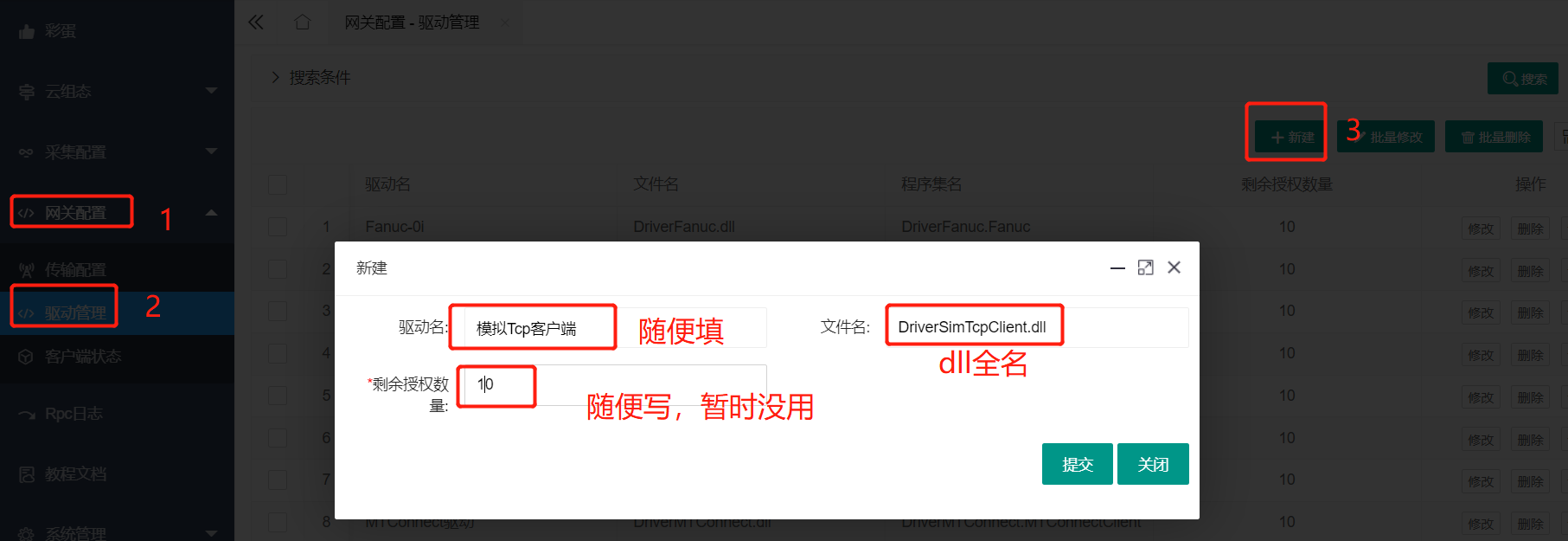
:::warning 注意
添加驱动后需要重启一下项目,后面会优化
:::
创建设备
- 采集配置->设备维护->添加设备
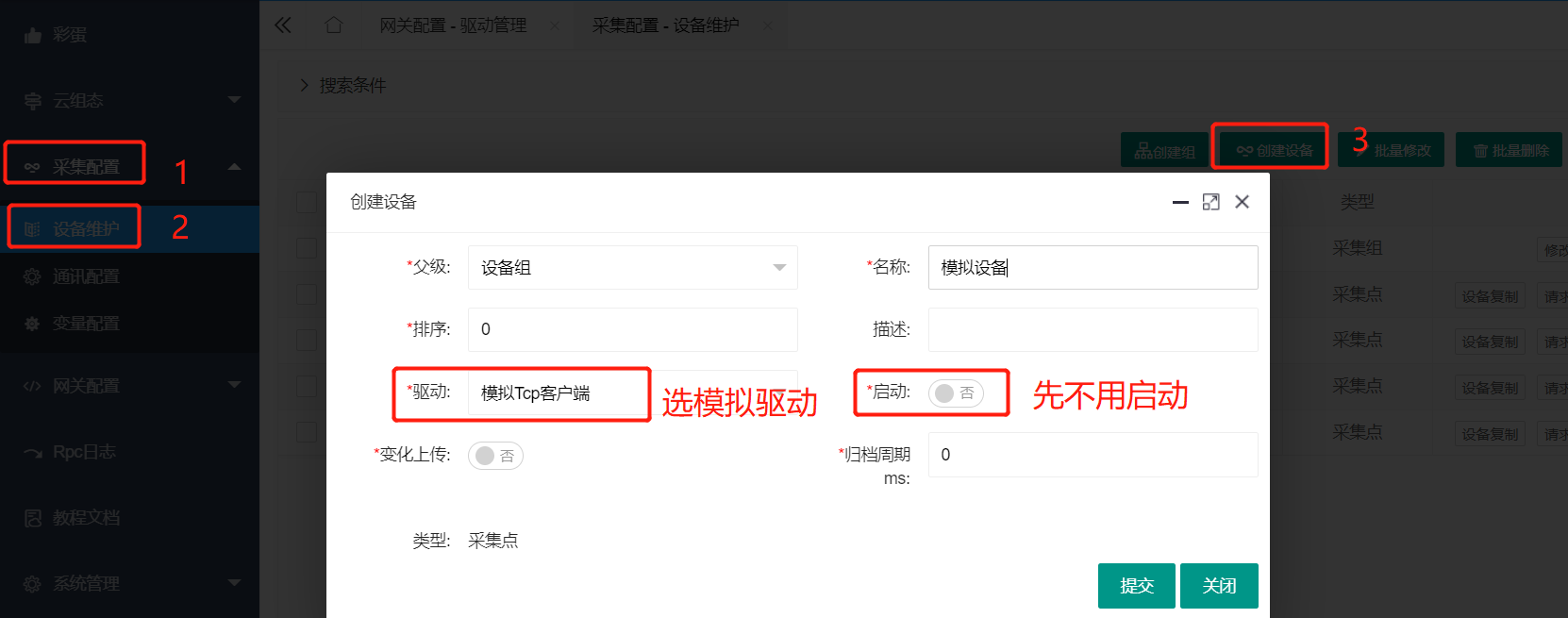
添加变量
- 采集配置->设备维护->添加设备
手动添加或者通过excel批量导入下面变量
| 变量名 | 方法 | 地址 | 类型 | 表达式 | 设备名 |
|---|---|---|---|---|---|
| 运行状态 | Read | 1 | uint8 | 模拟设备 | |
| 设备温度 | Read | 2 | float | 模拟设备 | |
| 电机转速 | Read | 6 | int16 | raw*0.01 | 模拟设备 |
开始采集
采集配置->设备维护->编辑设备
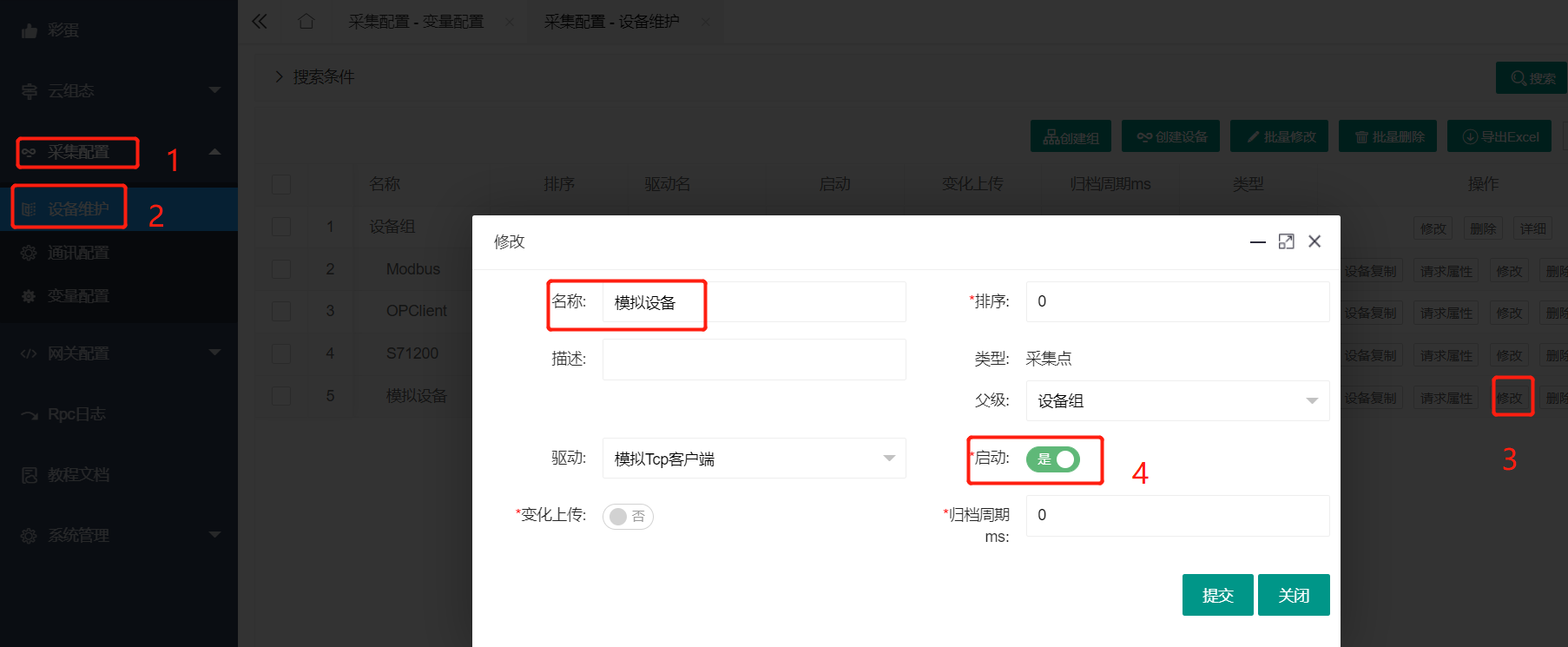
启动TcpServer
运行你熟悉的TCPServer测试工具,启动端口6666,网关客户端连接后发送响应报文
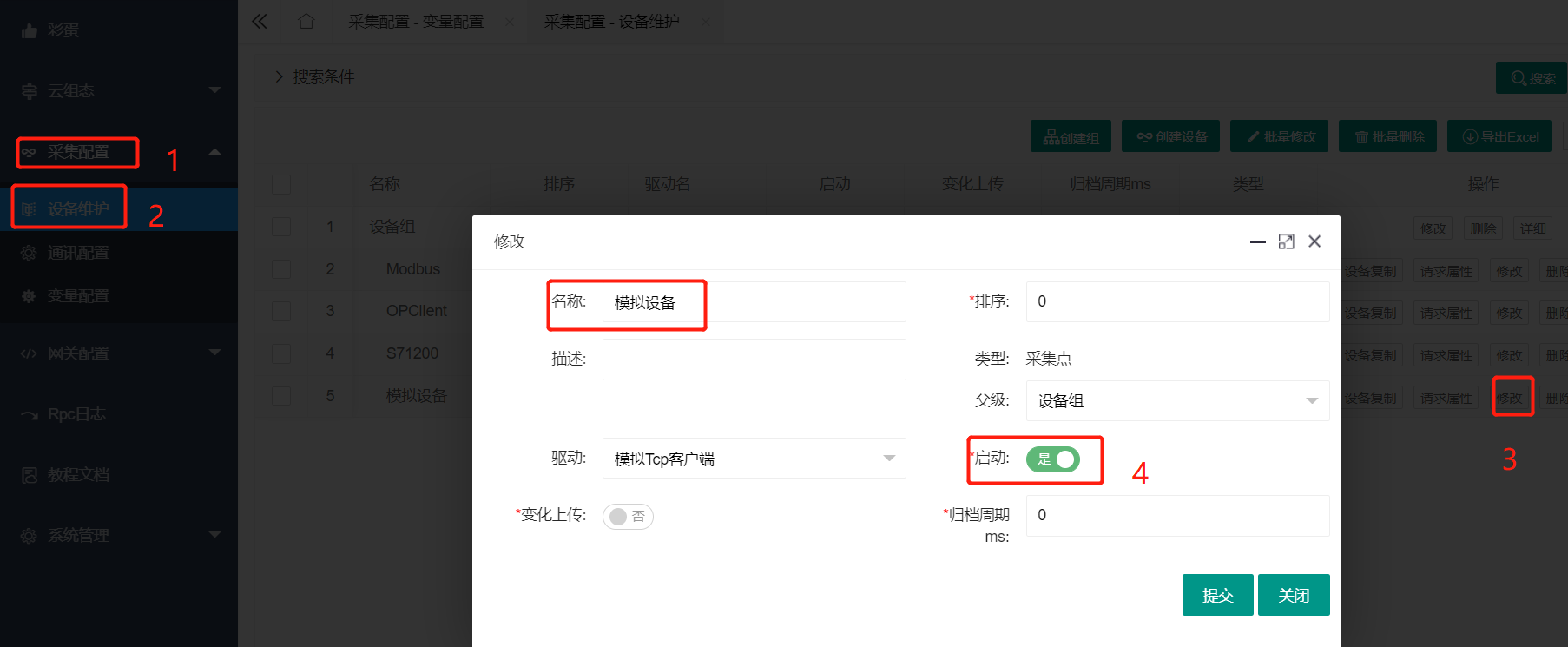
查看数据





